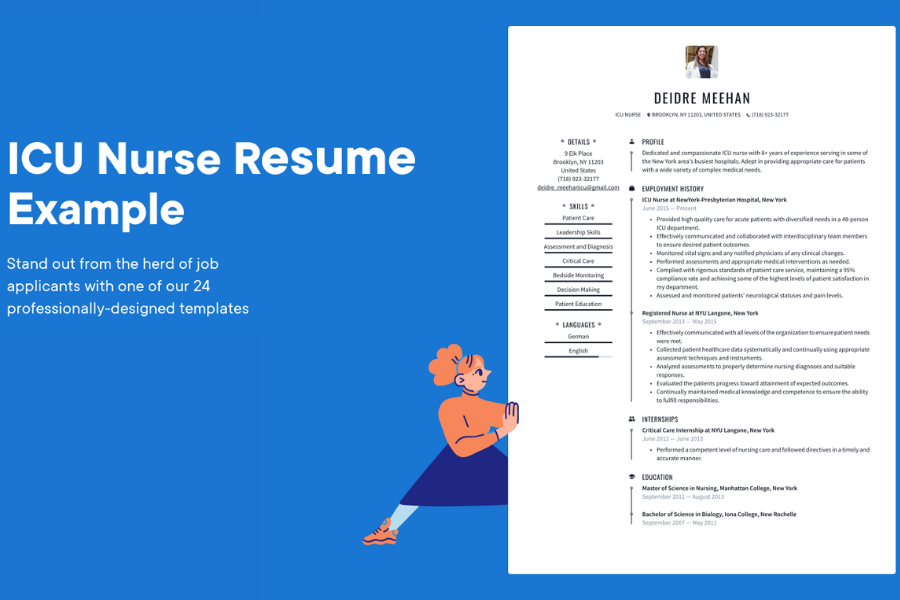Nurse Resume Example: A Guide To Crafting A Winning Healthcare Resume
A well-crafted nurse resume example is essential for securing positions in hospitals, clinics, and other healthcare settings. This guide provides actionable tips, a detailed resume template, and key insights to help you create a professional and impactful nurse resume.
Importance of a Strong Nurse Resume
A nurse’s resume is more than a list of qualifications; it’s a reflection of your skills, experience, and dedication to patient care. Employers look for resumes that demonstrate clinical expertise, empathy, and the ability to thrive in high-pressure environments.
“A standout nurse resume highlights both technical skills and a compassionate approach to patient care.”
Key Sections of a Nurse Resume
Your nurse resume should include the following sections:
1. Contact Information
- Full Name
- Phone Number
- Email Address
- LinkedIn Profile (optional)
- Personal Website or Portfolio (if applicable)
2. Professional Summary
A concise summary of your nursing expertise, certifications, and career objectives.
3. Core Competencies
Highlight key nursing skills such as:
- Patient Assessment
- Medication Administration
- Wound Care
- Electronic Health Records (EHR) Management
- Team Collaboration
- Patient Education
4. Work Experience
For each position, include:
- Job Title
- Healthcare Facility Name
- Employment Dates
- Key Responsibilities and Achievements
5. Education
- Degree (e.g., Bachelor of Science in Nursing)
- Institution Name
- Graduation Year
6. Certifications and Licenses
Include certifications such as:
- RN License
- ACLS (Advanced Cardiovascular Life Support)
- BLS (Basic Life Support)
- PALS (Pediatric Advanced Life Support)
7. Additional Sections
- Languages
- Volunteer Experience
- Awards and Recognitions
Example Nurse Resume Template
Here’s a sample template to guide you:
[Your Full Name]
[Your Address]
[City, State, ZIP Code]
[Phone Number] | [Email Address] | [LinkedIn Profile]
**Professional Summary**
[Write a brief summary about your nursing expertise, certifications, and career goals.]
**Core Competencies**
– Patient Assessment
– Medication Administration
– Wound Care
– EHR Management
– Team Collaboration
– Patient Education
**Work Experience**
**[Job Title]**
[Healthcare Facility Name], [City, State]
[Start Date] – [End Date or Present]
– [Responsibility/Achievement 1]
– [Responsibility/Achievement 2]
– [Responsibility/Achievement 3]
**Education**
**[Degree]**
[Institution Name], [City, State]
[Year of Graduation]
– [Key Subject or Achievement]
**Certifications and Licenses**
– Registered Nurse (RN) License
– ACLS Certification
– BLS Certification
– [Other Relevant Certification]
**Languages**
– [Language and Proficiency Level]
**Volunteer Experience**
[Optional Section for Personal Touch]
Tips for Writing a Nurse Resume
1. Tailor Your Resume
Customize your resume for each job by incorporating keywords from the job description.
2. Highlight Achievements
Focus on quantifiable achievements, such as:
- “Reduced patient readmission rates by 10% through effective discharge planning.”
- “Administered medications to 30+ patients daily with 100% accuracy.”
3. Showcase Specialized Skills
Emphasize expertise in specific areas, such as ICU nursing, pediatric care, or surgical assistance.
4. Use Professional Formatting
- Choose a clean and modern layout.
- Use fonts like Arial, Calibri, or Times New Roman.
- Limit your resume to one or two pages.
Comparison Table: Entry-Level vs. Experienced Nurse Resume
| Aspect | Entry-Level Nurse | Experienced Nurse |
| Focus | Education and Clinical Rotations | Work Experience and Achievements |
| Certifications | BLS, RN License | Advanced Certifications (e.g., ACLS) |
| Skills | Basic Patient Care | Specialized Skills (e.g., ICU, ER) |
| Objective | Emphasize Career Goals | Highlight Leadership and Expertise |
Common Mistakes to Avoid
- Overloading with Jargon Use clear and concise language instead of excessive medical terminology.
- Neglecting Soft Skills Highlight interpersonal skills like empathy, teamwork, and communication.
- Ignoring ATS Compatibility Ensure your resume is formatted for Applicant Tracking Systems (ATS) by avoiding graphics and using standard section headers.
- Failing to Update Regularly Keep your resume updated with new certifications, skills, and experiences.
“A polished nurse resume not only opens doors but also demonstrates your commitment to quality care.”
FAQs About Nurse Resumes
1. What should I include in a nurse resume?
Include sections like contact information, professional summary, core competencies, work experience, education, certifications, and relevant skills.
2. How can I make my nurse resume stand out?
Focus on achievements, use metrics to quantify your impact, and tailor your resume to the job description.
3. What certifications are essential for nurses?
Key certifications include RN License, ACLS, BLS, and PALS.
4. Should I include clinical rotations in my resume?
Yes, for entry-level nurses, clinical rotations demonstrate practical experience and skills.
5. How long should a nurse resume be?
Aim for one to two pages, depending on your experience level.
By following this guide and leveraging the provided template, you can create a nurse resume that showcases your skills and positions you as a top candidate in the healthcare industry. Start crafting your resume today and take the next step in your nursing career!






